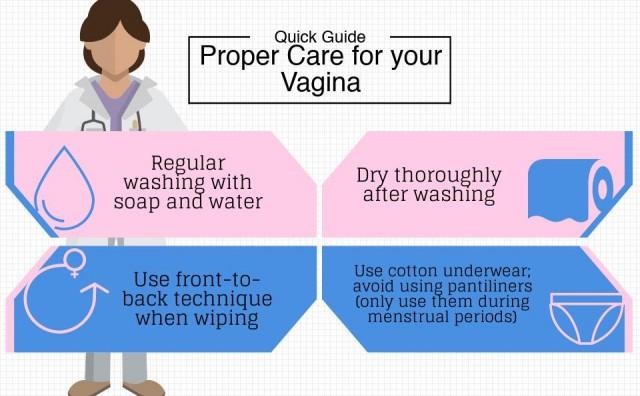V is for Vaginal Care, as prescribed by gynecologists

[It's International Women's Month. Let's talk about issues and concerns that women face. This week, it's feminine hygiene.]
Dear, step away from Google just for a moment.
If there's something bothering you down there — as in your vagina, to be clear — don't hesitate to consult your doctor. Chronic itching, distressing discharge...please go see a professional. The OB-Gyne will help you, not judge you.
That being said, let's talk about the things that you can do to keep your vagina healthy. Feminine hygiene isn't complicated, but it can get confusing when your being bombarded by images of flowers and fruits.
To clear the air, OB-Gynecologists Inna Mangalindan and Gia Pastorfide shared with GMA News Online all you need to know about taking care of your vajayjay.
There's minimal effort required, here's a quick guide:

What's it supposed to smell like anyway?
According to Mangalindan, "the best person who can determine if the vaginal odor is worrisome is you yourself."
"[See a doctor] if you feel that your discharge has a foul odor or any odor bad enough to warrant your attention," Mangalindan said via an email interview.
Consult your doctor too if there's profuse discharge, regardless of color.
In an #AskAway Session, Pastorfide further defined what qualifies as "abnormal discharge."
Aside from that "fishy odor", the dischrage "would be green or brown and mucoid or thick (malapot) in consistency," Pastorfide explained.
Normal discharge happens every month and is usually white or clear. However, this white or clear discharge can still indicate that the pH balance of your vagina is thrown off if it smells unusual to you.
Wait, what's pH balance?
It's important to remember that there's good and bad bacteria — and the vagina is an amazing organ that naturally has the good stuff to counter the bad stuff.
"The vagina has an acidic environment, which in itself is bactericidal. This acidity is brought about by vaginal Lactobacilli, which are the resident 'good' bacteria that helps protect the vagina from infections," Mangalindan said.
She added, "The normal vaginal environment is healthy enough to produce a natural barrier from harmful bacteria. Simply put, the vagina has its own safeguards in place that protect it from harm."
So...no special soaps required?
Mangalindan said that feminine wash is not really necessary and Pastorfide seconded this. "[Using feminine wash every day] actually alters the pH of the vagina. Soap and water is fine," Pastorfide said.
When you have your period, washing with gentle soap and water is sufficient. "Menstrual blood in itself is sterile and comes from the uterine cavity that is also sterile," Mangalindan said, emphasizing the vagina's amazing self-sufficient cleaning system.
But if you like using feminine wash, Pastorfide said using it every other day is okay. She does have an important reminder: Feminine wash is s for external use only. As in, don't go inside.
Pastorifde additionally warned against home remedies listed in various websites for vaginal problems like yeast infections and bacterial vaginosis.
"When you have questions, don't hesitate to ask... [and] try to look for answers from correct sources. You won't find everything from Mr. Google. In fact, there's a lot of misconstrued information there," Pastorfide said. — LA, GMA News
RELATED: Painful 'puson', period poop, and weirdly colored discharge: Why is my 'mens' so metal?




